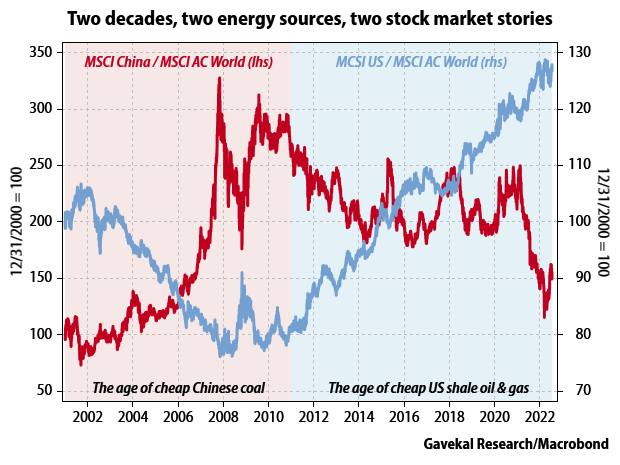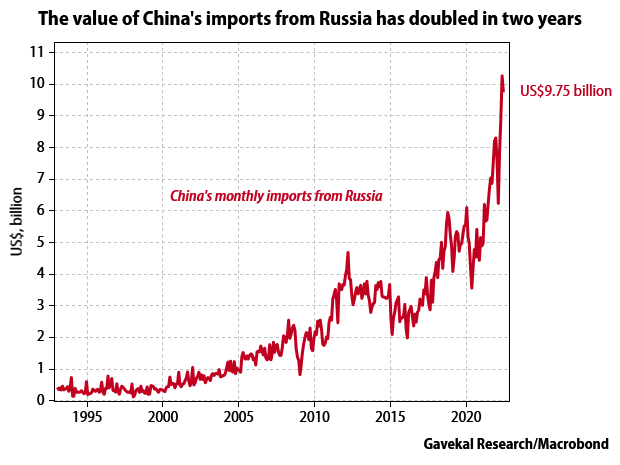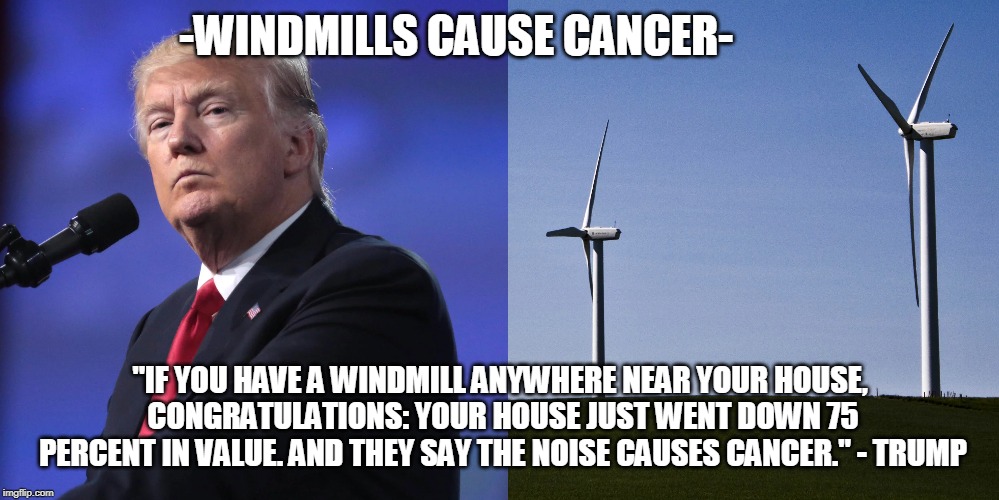This is why Europe pushes "green energy" and is anti carbon.........they are at a competitive disadvantage if they cannot level the playing field on a global basis.
Here is the Daily note from Gavekal Research.
Who Gets Cheap Energy Tomorrow? — by Louis Gave
Most economic activity is energy transformed, so it stands to reason that whoever has the cheapest cost of energy gets a headstart in the relative performance race. This is especially true when energy prices are high and so figure as an even more important input than usual in the production process.
Between 2000 and 2011, China burned a lot of cheap domestic coal. The costs to its environment and the lungs of its children were high, but China’s economy benefited from the lowest cost of electricity. Following tighter environmental regulation and the shale revolution, China passed the cheap-energy-producer baton to the US, whose markets duly outperformed for the next decade (see the chart below and Another Epochal Shift?).

This raises an obvious question: who will benefit from the cheapest cost of energy over the coming decade? Two possible answers spring to mind:
The second answer points to another important shift in the global energy equation: Russia has changed how it sell its energy. When selling to countries Moscow considers adversaries (mostly Nato members), it is now asking for payment in rubles (which in essence means in gold). Otherwise, Russia is willing to accept payment for its energy exports in the local currencies of countries, such as China or India, that Russia counts as friends.
- Whoever is willing to burn coal to produce energy.
- Whoever is willing to buy discounted energy from Russia.
Before Covid, China would import goods and services worth around US$5bn a month from Russia. In a little over two years, that number has doubled. Yes, much of this increase has been driven by the rise in commodity prices. But there are other factors at work, too. Because of the Ukraine war, China’s imports from Russia are now priced in renminbi, rather than US dollars. This currency shift has removed a major constraint on Chinese importers: the availability and cost of US dollar funding.

Looking ahead from here, the world will basically split into four energy blocs:
It is obvious that Europe has got the thin end of the stick here. And it is also pretty clear that Asia is better placed to handle today’s unfolding energy crisis than it was able to handle the successive energy crises of past decades.
- North America is broadly energetically independent, and its energy is priced in its own local currency: the US dollar. Moreover, North America has the ability to return to coal fairly easily (there is lots of coal and plenty of functioning coal mines in North America)
- Europe is dependent on imported energy. And its energy imports are shifting from being priced in euros to being priced in US dollars. Moreover, Europe’s ability to return to coal is limited; most European coal mines were shut down in the 1980s and cannot reopen.
- Emerging Asia has the ability to return to coal. But it may not need to, as countries in the region can now import discounted energy from Russia priced in renminbi and other local Asian currencies.
- Japan has the ability to restart its nuclear power stations, and possibly the ability to import energy from Russia; Japan has been far less vocal than European countries in condemning Russia’s invasion of Ukraine.
Colleges
- AAC
- ACC
- Big 12
- Big East
- Big Ten
- Pac-12
- SEC
- Atlantic 10
- Conference USA
- Independents
- Junior College
- Mountain West
- Sun Belt
- MAC
- More
- Navy
- UAB
- Tulsa
- UTSA
- Charlotte
- Florida Atlantic
- Temple
- Rice
- East Carolina
- USF
- SMU
- North Texas
- Tulane
- Memphis
- Miami
- Louisville
- Virginia
- Syracuse
- Wake Forest
- Duke
- Boston College
- Virginia Tech
- Georgia Tech
- Pittsburgh
- North Carolina
- North Carolina State
- Clemson
- Florida State
- Cincinnati
- BYU
- Houston
- Iowa State
- Kansas State
- Kansas
- Texas
- Oklahoma State
- TCU
- Texas Tech
- Baylor
- Oklahoma
- UCF
- West Virginia
- Wisconsin
- Penn State
- Ohio State
- Purdue
- Minnesota
- Iowa
- Nebraska
- Illinois
- Indiana
- Rutgers
- Michigan State
- Maryland
- Michigan
- Northwestern
- Arizona State
- Oregon State
- UCLA
- Colorado
- Stanford
- Oregon
- Arizona
- California
- Washington
- USC
- Utah
- Washington State
- Texas A&M
- Auburn
- Mississippi State
- Kentucky
- South Carolina
- Arkansas
- Florida
- Missouri
- Ole Miss
- Alabama
- LSU
- Georgia
- Vanderbilt
- Tennessee
- Louisiana Tech
- New Mexico State
- Middle Tennessee
- Western Kentucky
- UTEP
- Florida International University
High School
- West
- Midwest
- Northeast
- Southeast
- Other
- Alaska
- Arizona
- California
- Colorado
- Nevada
- New Mexico
- Northern California
- Oregon
- Southern California Preps
- Washington
- Edgy Tim
- Indiana
- Kansas
- Nebraska
- Iowa
- Michigan
- Minnesota
- Missouri
- Oklahoma Varsity
- Texas Basketball
- Texas
- Wisconsin
- Delaware
- Maryland
- New Jersey Basketball
- New Jersey
- New York City Basketball
- Ohio
- Pennsylvania
- Greater Cincinnati
- Virginia
- West Virginia Preps
ADVERTISEMENT
Install the app
How to install the app on iOS
Follow along with the video below to see how to install our site as a web app on your home screen.
Note: This feature may not be available in some browsers.
You are using an out of date browser. It may not display this or other websites correctly.
You should upgrade or use an alternative browser.
You should upgrade or use an alternative browser.
Europe and Green Energy Push - Level The Playing Field
- Thread starter jakefest
- Start date
europe royally ****ed up caving to nuclear energy extremists back in the 80s (mainly driven by Chernobyl). i know a lot of that was mainly due to the handling of nuclear waste, which we've been able to improve upon the last 30+ years, but i think nuclear energy is something everyone on both sides should be able to embrace.
Yes, so long as we can avoid Fukushima from occurring again, this is a solid takeeurope royally ****ed up caving to nuclear energy extremists back in the 80s (mainly driven by Chernobyl). i know a lot of that was mainly due to the handling of nuclear waste, which we've been able to improve upon the last 30+ years, but i think nuclear energy is something everyone on both sides should be able to embrace.
Agreed. I’ve long disagreed with my German friends on their anti-nuclear stance. At the same time, though, I can sympathize with the trepidation held by those who actually lived through the fallout of Chernobyl. The radiation cloud from Chernobyl was pretty gnarly for Germany — especially East Germany.europe royally ****ed up caving to nuclear energy extremists back in the 80s (mainly driven by Chernobyl). i know a lot of that was mainly due to the handling of nuclear waste, which we've been able to improve upon the last 30+ years, but i think nuclear energy is something everyone on both sides should be able to embrace.
I do wish Germany would change their mind on nuclear, but sadly I don’t think there’s any hope for that under their current government coalition. This article does a good job of explaining why — it’s all about the political headwinds of course: https://www.politico.eu/article/politics-behind-germany-refusal-reconsider-nuclear-phaseout/
Agreed that we “should”, but still a long way to go. We, in the US, still have to solve the spent fuel issue. I STILL have people tell me that they think we’re taking San Onofre’s spent fuel to Yucca Mountain. SMH.europe royally ****ed up caving to nuclear energy extremists back in the 80s (mainly driven by Chernobyl). i know a lot of that was mainly due to the handling of nuclear waste, which we've been able to improve upon the last 30+ years, but i think nuclear energy is something everyone on both sides should be able to embrace.
Nope, still have 123 canisters of it sitting behind a 30’ tsunami wall about spitting distance from the Pacific Ocean.
Our landlord is absolutely thrilled that we have no permanent federal repository to move it into…and we keep suing the Feds for their utter and complete failure to have a repository up & running.
Last edited:
you work in the nuclear field? if so, i'm curious what your take is on the viability of deep well injection disposal of liquid nuclear waste. is that something you think is a viable solution? we currently do it for plenty of hazardous and nonhazardous wastes, but i imagine nuclear waste is a completely different animalAgreed that we “should”, but still a long way to go. We, in the US, still have to solve the spent fuel issue. I STILL have people tell me that they think we’re taking San Onofre’s spent fuel to Yucca Mountain. SMH.
Nope, still have 123 canisters of it sitting behind a 30’ tsunami wall about spitting distance from the Pacific Ocean.
Our landlord is absolutely thrilled that we have no permanent federal repository to move it into…and we keep suing the Feds for their utter and complete failure to have a repository up & running.
While technically feasible, the bulk of the waste is solid. I can’t even imagine permitting (definitely not your typical UIC permit) such an effort and the geology would have to be just about perfect.
It would very likely never be permitted out here as CA has already had one well-publicized “bad experience” with subsurface storage (natural gas) in a geologic formation.
It would very likely never be permitted out here as CA has already had one well-publicized “bad experience” with subsurface storage (natural gas) in a geologic formation.
Look at all of the great ideas from dems and their stable genius minds. 
Last edited:

Similar threads
- Replies
- 39
- Views
- 423
- Replies
- 22
- Views
- 438
- Replies
- 0
- Views
- 148
- Replies
- 38
- Views
- 423
- Replies
- 114
- Views
- 2K
ADVERTISEMENT
Latest posts
-
-
-
**** Official ⚾ TI #4 Clemson @ Louisville In-game Thread (TODAY - 1 p.m.)
- Latest: gooddogjudge
-
-
Why isn’t the Baseball Game against Coastal Carolina being made up?
- Latest: MaxCalifornia
ADVERTISEMENT


